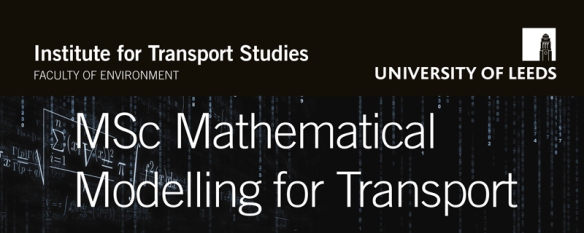While mathematical models have been relied upon to understand, analyse and design transportation systems for many decades [1], such models face challenges due to our living in a time of rapid change. New technologies are being harnessed to deliver new mobility services, and huge volumes of data promise to reveal our changing patterns of movement.
Traditional transport engineering programmes expose students to some of the standard models that are used in practice, but very few give in-depth treatment to the innovation and development of mathematical models – how do we adapt existing models and create new ones to tackle scenarios faced by the transport sector today and in the future? Furthermore, little attention has previously been given to dealing with large volumes of data in terms of data management, synthesis, analysis and visualisation.
This programme was developed in response to industry needs
Early in 2015 I interviewed a variety of transport professionals to discuss the current state of transport modelling: were there any significant new challenges? What sort of skills were they looking for in graduates?
Clearly there continues to be a need for planners, engineers and economists, but to add to these teams, there was a unanimous desire to find technically adept modellers. Again and again I heard comments such as the following:
We need modellers who are flexible and can apply their skills to new problems. They need to understand the assumptions and limitations of the models being used. They need some programming skills; to be able to write custom scripts to tweak existing models or software. They need to be able to handle data (not just in excel) and bring data together from different sources.
It is not only the volume of data that can be an obstacle, but also the need to clean, filter, collate and transform raw data into something useful, and then to align and synthesise data from different sources: Bluetooth detectors, traffic flow measurements, weather records, GPS tracks, mobile phone data etc. Clearly this is a rapidly growing challenge for transport analysts.
It is important to note that alongside the ability to address new technical challenges, it is also crucial that this new generation of transport modellers understand existing, accepted, transport models, which remain the foundation for government policy and are used, for example, to determine whether major infrastructure investment is justified. Innovators will need to understand and respect established methodologies and guidance, and leverage them in developing new advanced approaches.
There is significant demand for technically adept modellers in the transport sector
This new programme is not only designed to satisfy a clear need from the transport industry, there is also enormous potential for students with these skills in academic research and this programme would be the perfect stepping stone toward a PhD. A couple of examples:
We are witnessing incredibly rapid expansion in the instrumentation of infrastructure, vehicles and individuals (via mobile devices and smart ticketing) which is already bringing an avalanche of data. These data undoubtedly hold the potential for new understanding about mobility patterns and travel choices, and hence the possibility to improve transport provision. It is an active research challenge to integrate data science with established transport modelling approaches.
Advances in technology keep changing our visions of the future. It now seems reasonable that autonomous vehicles should be included in a 50 year strategic transport plan, but how? Representations of autonomous vehicles in transport models and how they might change future mobility is another important research area.
Imagining possible futures for interconnected complex systems of transportation needs mathematically fluent researchers.
The core content of the MSc Mathematical Modelling for Transport focuses on several key areas:
- How to use mathematical models to represent transport systems, for understanding, forecasting and design/optimisation.
- How to apply models to tackle real world scale transport issues using commercial software.
- How to handle, manage and analyse large data sets.
In a one year programme it would be impossible to cover all of the mathematical models used in transport. The aim of this programme is not to exhaustively recite all possible models, but rather to develop modelling skills so that students can tackle new scenarios in a flexible way, modifying existing models, borrowing techniques from other disciplines and writing bits of code to implement them. This requires a good grounding in mathematics (being comfortable with equations) in order to grasp the usefulness and limitations of different modelling approaches, and hence be able to justify the validity of new solutions to new problems.
The Institute for Transport Studies
We have a very strong international reputation for research and teaching. In particular we have genuine world class expertise in mathematical modelling and data science, and these experts will be delivering this programme. Students will have the opportunity to work in small groups with world leading researchers, and on a one-to-one basis during their dissertation.
How to apply
Applications are encouraged from those with a solid understanding of mathematics. What do we mean by this? Any degree with advanced mathematics modules would be sufficient e.g. mathematics, physics, computer science etc. However there will be many people who have the appropriate level of maths from programmes such as engineering or economics, or due to other education/experience. As with our other MSc programmes, we are always happy to advise prospective student on their suitability
The programme is available either for full-time study (12 months) or part-time (typically over 24-36 months but flexible). The first student intake is September 2016 and we are offering a number of scholarships to help with the tuition fees.
For further details please see www.its.leeds.ac.uk/courses/masters/msc-mathematical-modelling-transport
Please feel free to contact me with any questions.
Dr Richard Connors
Programme Leader
R.D.Connors@its.leeds.ac.uk
http://www.its.leeds.ac.uk/people/r.connors


